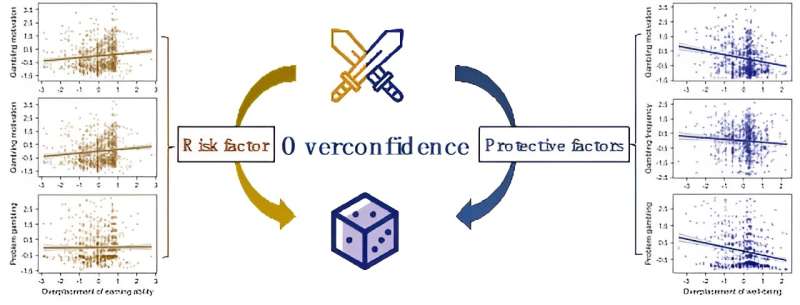This article has been reviewed according to Science X's editorial process and policies. Editors have highlighted the following attributes while ensuring the content's credibility:
fact-checked
peer-reviewed publication
trusted source
proofread
Researchers reveal the double-edged-sword effect of overconfidence on gambling

As a popular form of entertainment in modern society, the gambling industry has been hailed as "the heart of the economy in the post-industrial era." However, gambling poses serious risks, not only to the financial and psychological well-being of individuals, but also to social stability. As a result, it has long been a focal point in the field of behavioral decision-making, with scholars striving to understand its causes and influencing factors.
A research team led by Dr. Liang Zhuyuan from the Institute of Psychology of the Chinese Academy of Sciences has discovered a double-edged-sword effect of overconfidence on gambling. The study was published in the Journal of Gambling Studies.
In their study, which involved 127 college students and 733 casino gamblers in Macau, the researchers measured participants' levels of overconfidence, gambling-related motivations, and behaviors. A unique aspect of this study was the use of a social comparison process to measure overconfidence: Participants were asked to rate their earning potential or happiness relative to 100 peers who were similar to them.
The results showed that overconfidence significantly predicted individuals' gambling motivation and behaviors, but the direction of its effects varied depending on the domain of social comparison. Individuals who believed they were more deserving than others tended to exhibit greater gambling motivation and frequency.
Conversely, those who perceived themselves as less happy than others were more likely to engage in problem gambling behavior. Importantly, this double-edged-sword effect of overconfidence persisted even after accounting for demographics and other relevant cognitive factors, such as risk preferences.
"Many of us see the world through rose-colored glasses. However, for gamblers, it's important to rethink when to wear them: Taking them off when comparing external abilities and putting them on when assessing internal states may help mitigate problem gambling," said Dr. Liang, corresponding author of the study.
This finding expands our understanding of the relationship between overconfidence and gambling by shifting from a cognitive bias perspective to a social comparison perspective. It also provides valuable insights for future interventions aimed at addressing gambling-related problems: Helping individuals to break their blind confidence in their external abilities and increase their relative happiness could be a potential intervention strategy.
More information: Yuepei Xu et al, A Double-Edged-Sword Effect of Overplacement: Social Comparison Bias Predicts Gambling Motivations and Behaviors in Chinese Casino Gamblers, Journal of Gambling Studies (2024). DOI: 10.1007/s10899-024-10293-8


















